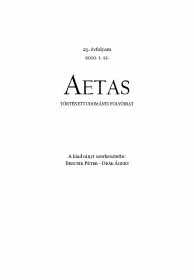A koldulás helyi szintű kezelése Magyarországon a dualizmus korában
The Local Regulation of Begging in the Age of the Dual Monarchy
Author(s): Attila KocsisSubject(s): History
Published by: AETAS Könyv- és Lapkiadó Egyesület
Summary/Abstract: The paper deals with a period relatively rarely investigated in the history of social policy in Hungary: it looks at anti-poverty policy in the age of the Dual Monarchy. It describes its main characteristics, but as opposed to previous studies, which focused rather on legal history, it primarily concentrates on how the whole system operated in practice. It shows the measures the society of the era took against the problem of poverty, as well as the regulations against some of its manifestations, namely begging and vagrancy. Besides the central anti-poverty legislation and the challenges of financing the system, it describes what part private charity organizations, the central government and the public administration in the communities played in the anti-poverty policy of the age. As it was the individual settlements that constituted the basic units of anti-poverty policy during the Dual Monarchy, the practical activity of these are in the focus of the analysis. Using statistical data, archival materials, poverty policy sources about the anti-policy measures taken in the capital and the country towns, the paper examines the operation of public benefits on a local basis, the functioning of indoor poor relief and the main objectives of the regulations against beggars and vagrants, the role of the workhouse and banishment. Finally, it discusses those institutional deficiencies of anti-poverty policy that made these measures, aimed at managing the social tensions that accompanied the dissolution of traditional employment structures, ineffective.
Journal: AETAS - Történettudományi folyóirat
- Issue Year: 2010
- Issue No: 1
- Page Range: 5-23
- Page Count: 19
- Language: Hungarian

